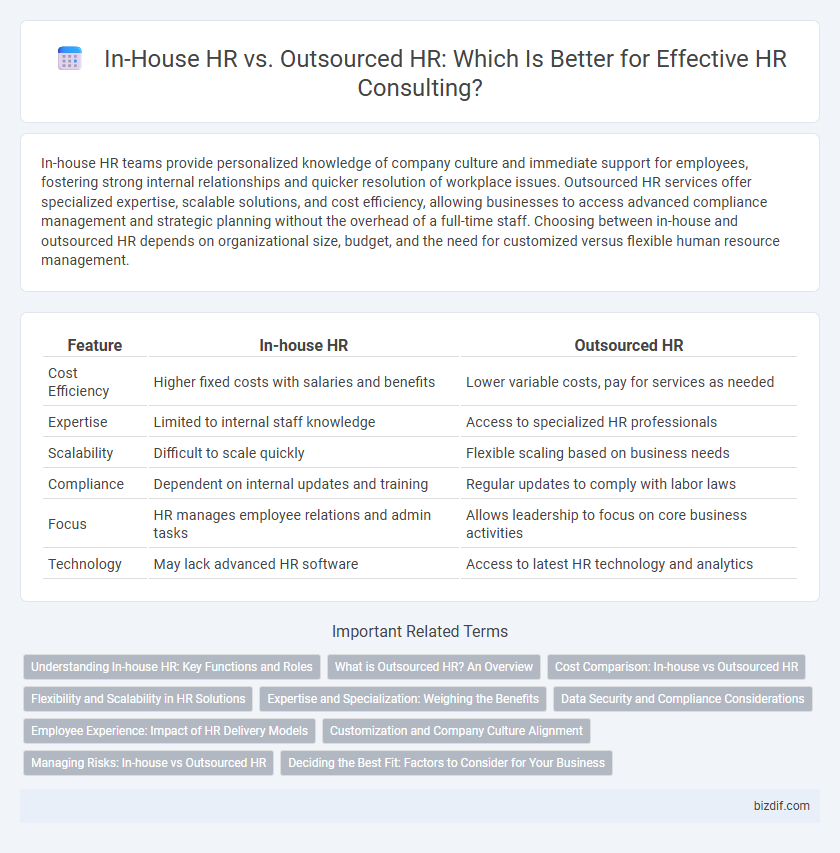In-house HR teams provide personalized knowledge of company culture and immediate support for employees, fostering strong internal relationships and quicker resolution of workplace issues. Outsourced HR services offer specialized expertise, scalable solutions, and cost efficiency, allowing businesses to access advanced compliance management and strategic planning without the overhead of a full-time staff. Choosing between in-house and outsourced HR depends on organizational size, budget, and the need for customized versus flexible human resource management.
Table of Comparison
| Feature | In-house HR | Outsourced HR |
|---|---|---|
| Cost Efficiency | Higher fixed costs with salaries and benefits | Lower variable costs, pay for services as needed |
| Expertise | Limited to internal staff knowledge | Access to specialized HR professionals |
| Scalability | Difficult to scale quickly | Flexible scaling based on business needs |
| Compliance | Dependent on internal updates and training | Regular updates to comply with labor laws |
| Focus | HR manages employee relations and admin tasks | Allows leadership to focus on core business activities |
| Technology | May lack advanced HR software | Access to latest HR technology and analytics |
Understanding In-house HR: Key Functions and Roles
In-house HR teams manage core functions such as recruitment, employee relations, performance management, and compliance with labor laws, ensuring alignment with company culture and strategic goals. They provide personalized support and immediate response to employee needs, fostering a cohesive work environment. These roles often include HR managers, recruiters, training specialists, and benefits coordinators who work closely with leadership to drive organizational development.
What is Outsourced HR? An Overview
Outsourced HR involves delegating human resource functions to an external service provider, allowing companies to access specialized expertise and scalable support without expanding internal teams. Services typically include payroll management, recruitment, compliance, and employee relations, optimizing operational efficiency and reducing costs. This model benefits businesses seeking flexibility and strategic HR solutions while maintaining focus on core activities.
Cost Comparison: In-house vs Outsourced HR
In-house HR generally requires higher fixed costs, including salaries, benefits, training, and technology investments, which can strain budgets, especially for small to mid-sized businesses. Outsourced HR offers a variable cost model, allowing companies to pay only for needed services, often resulting in significant savings on recruitment, compliance, and administrative tasks. Cost efficiency of outsourced HR increases with scalability and access to specialized expertise without the overhead of maintaining a full-time HR team.
Flexibility and Scalability in HR Solutions
In-house HR teams offer deep organizational knowledge but may face limitations in flexibility and scalability during peak workloads or rapid growth phases. Outsourced HR solutions provide scalable resources that adapt quickly to fluctuating business needs, ensuring continuous support without the constraints of fixed staffing. Leveraging outsourced HR allows companies to customize services dynamically, optimizing efficiency and responsiveness in talent management and compliance.
Expertise and Specialization: Weighing the Benefits
In-house HR teams offer deep organizational knowledge and direct alignment with company culture, enhancing employee relations and tailored policy development. Outsourced HR providers bring specialized expertise across compliance, talent acquisition, and benefits administration, leveraging industry best practices and advanced technology. Balancing in-house familiarity with outsourced specialization enables companies to optimize HR functions while managing costs and mitigating risks effectively.
Data Security and Compliance Considerations
In-house HR teams maintain direct control over sensitive employee data, enabling stricter adherence to company-specific data security protocols and compliance requirements under regulations such as GDPR and HIPAA. Outsourced HR providers must demonstrate robust cybersecurity measures and compliance certifications to protect confidential information and mitigate risks of data breaches. Choosing between in-house and outsourced HR depends on the organization's ability to manage data privacy responsibilities and ensure regulatory compliance efficiently.
Employee Experience: Impact of HR Delivery Models
In-house HR teams provide personalized employee experiences through direct engagement and intimate knowledge of company culture, fostering stronger employee satisfaction and retention. Outsourced HR services leverage technology and specialized expertise to streamline processes and deliver scalable solutions, enhancing efficiency but potentially reducing the sense of personalized support. Choosing the right HR delivery model significantly influences employee engagement, workplace morale, and the overall effectiveness of talent management strategies.
Customization and Company Culture Alignment
In-house HR teams offer deep customization tailored to company-specific needs, fostering seamless alignment with organizational culture and values. Outsourced HR providers may deliver standardized solutions, which can limit flexibility but bring diverse expertise and scalability. Prioritizing company culture alignment enhances employee engagement and retention, making customized in-house HR a strategic advantage for businesses aiming for long-term growth.
Managing Risks: In-house vs Outsourced HR
Managing risks in HR involves evaluating control and compliance measures, with in-house HR providing direct oversight and tailored risk management aligned to company culture. Outsourced HR offers specialized expertise and reduces liability through updated regulatory knowledge but may pose challenges in maintaining consistent communication. Balancing risk mitigation requires assessing the organization's capacity for internal monitoring versus reliance on external accountability and legal safeguards.
Deciding the Best Fit: Factors to Consider for Your Business
Evaluating the best fit between in-house HR and outsourced HR hinges on factors such as company size, budget constraints, and specific talent management needs. Businesses with complex, strategic talent requirements and a desire for deep organizational integration benefit from dedicated in-house HR teams. Conversely, organizations seeking cost-efficiency, scalability, and access to broad expertise often find outsourced HR providers more advantageous.
In-house HR vs outsourced HR Infographic

 bizdif.com
bizdif.com